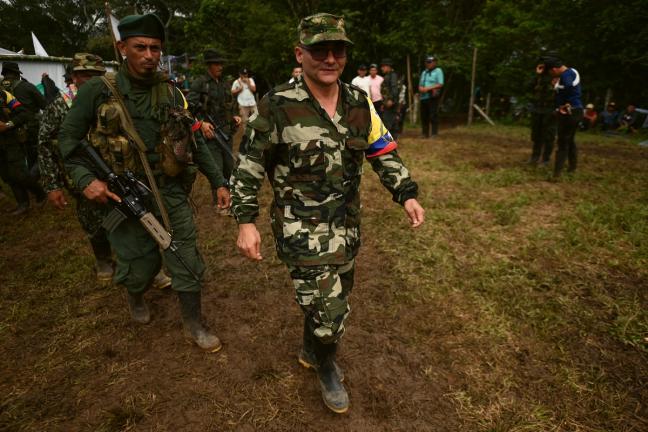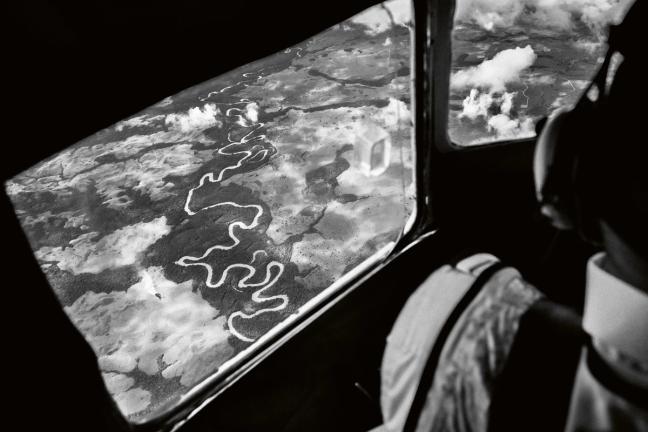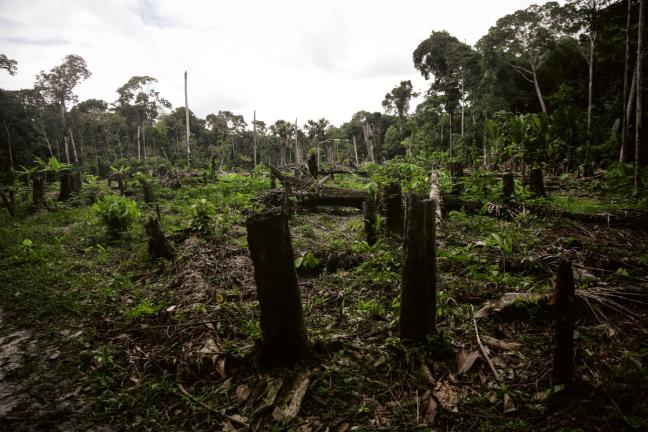Meet the cocaine warlord fighting to protect the Amazon
FARC leader, drug smuggler and local kingpin Iván Mordisco’s murky morals are temporarily halting deforestation in the remote reaches of the Colombian rainforest
Among the rural tracks of Colombia’s Guaviare province, a 10-hour drive from Bogota, a regional warlord holds sway, demanding tax from local gas stations and farmers. He’s known as Iván Mordisco, and he is also the most powerful figure in the region’s cocaine industry; buy cocaine from a dealer not authorised by Mordisco, and you’re unlikely to live to use it. He is also, bizarrely, the region’s best hope in the fight against deforestation.
Guaviare province is known as a centre of cattle ranching and coca farming. For some, the former is even more problematic than the drug industry, with clearing trees for cattle grazing – and the emissions the cows produce – accounting for 80 per cent of the total deforestation across the Amazon. Backed by a reported 2,200 armed fighters, Mordisco has implemented restrictions to curb this. In May, 2022, he introduced a fine of one million Colombian pesos (around £200) for each hectare of forest cut down without permission. Today, fines in Guaviare are said to be as high as 20 million pesos (just under £4,000).

All images: Getty
Average monthly income in Colombia is around £870, so it’s no surprise that rural farmers have capitulated to the warlord’s demands; since Mordisco passed his decree, deforestation in the Colombian Amazon has reportedly fallen by 76 per cent. It’s a unique paradox; reporting for Bloomberg, Matthew Bristow notes: “[Mordisco] is doing more to protect the Amazon rainforest than almost anyone else on Earth.”
Exactly why Mordisco has forbidden locals to cut down trees is unconfirmed, but it’s thought that maintaining the jungle canopy helps provide cover for his soldiers, as well as preventing the construction of more large cattle ranches, owned by powerful cattle barons who could wrest power in the area away from him. Nevertheless, Mordisco is attempting to put an environmental spin on it: “We have banned deforestation in the Amazon because we are a profoundly environmental guerrilla [group],” said Jose Tomas Ojeda Soleimani, a spokesperson for Mordisco, who also admitted that “the trees protect us and we need water for our military operations.”
Taking control of the forest is also a huge display of power. Deforestation has been a topic of contention in the Amazon for decades, with multiple international governments and agencies urging South American authorities to do everything in their power to protect an area frequently referred to as the ‘planet’s lungs’.

By showing that his troops are able to halt the felling of trees, Mordisco is flexing his muscles before President Gustavo Petro's government. “It proves to the government that he is in control of much of Colombia’s most environmentally sensitive territory, and can start and stop deforestation at will, which could provide leverage in talks,” argues Bristow.
“They can even threaten the government [with] large-scale Amazon destruction if the government doesn’t give them what they’re hoping for,” environmental-crime researcher Bram Ebus told Al Jazeera.
Petro is believed to be quietly endorsing Mordisco’s actions, with some groups seeing this as an outsourcing of forest protection, empowering a group of murderers and drug dealers to act as park rangers. It’s a strange, precarious status quo, as Angélica Rojas, a member of the Foundation for Conservation and Development NGO, told Bloomberg: “This isn’t sustainable, because it depends on the whims of an armed actor, not of the people, not of the government, not of anyone using any mechanisms other than force.”
Law of the Jungle
According to Bloomberg, visitors to the village of La Paz, on the edge of the Nukak forest reserve in Mordisco-held territory, are greeted with signs warning them to keep their windows down and to not obscure their faces, lest they be taken for rival forces, and attacked. This far out in the sticks, the Colombian state holds little sway, with Mordisco’s troops enforcing the law, including who gets to harvest trees.

“They don’t want people to continue the deforestation and they are the only ones who can stop it,” said Edgar Ariza, a community leader in La Paz.
The Amazon spans 2.1m square miles across Brazil, Bolivia, Peru, Ecuador, Colombia, Venezuela, Guyana and Suriname. As well as being the most diverse ecosystem on the planet, it serves as a vital carbon sink and helps recycle the planet’s oxygen. Sixty per cent of the forest is located in Brazil, where deforestation reached an all-time high in 2022.
Experts from the World Wildlife Fund (WWF) believe that at the current rate, climate change and deforestation might kill the rainforest by 2030 – including the 10 per cent located in Colombia. An estimated 17 per cent of the forest has been lost since the 1970s and the deforested areas are already having a knock-on effect on the rest. “We could lose the Amazon to a state of permanent, irreversible degradation that would impact the entire planet... the evidence gives a stark warning,” says WWF study author professor Mary Gagen.
Human activities such as logging, mining, road building and fires have served to further degrade the forest. As a result, an area a quarter of the size of Europe – 1.4 million square miles – has experienced a prolonged dry season and lack of rain that threatens to permanently degrade rich rainforest to barren scrubland.
Ironically, then, Mordisco has positioned himself as a strange climate hero – even if his ultimate motives have very little to do with protecting the planet, and everything to do with protecting his own power and influence in the area.
An Uncertain Future
Mordisco’s rise was gradual, then sudden. According to the Rio Times, his real name is Néstor Gregorio Vera Fernández, and, as well as establishing himself as a local kingpin, he has held senior positions in the Revolutionary Armed Forces of Colombia (FARC) since the late 1990s, graduating to temporary commander in 2009, when the group’s leader, Gerardo Aguilar, was captured. Then, in 2012, he shifted position to take charge of forced recruitment and the protection of drug crops in the areas of Guaviare and Vaupés.
FARC is defined as a Marxist–Leninist guerrilla group, and has been involved in constant conflict with the Colombian government since the so-called ‘Colombian conflict’ began in 1964, with both far-right and far-left groups, as well as drug organisations, battling the government and each other in an attempt to gain greater influence in the country.
“Mordisco is doing more to protect the Amazon rainforest than almost anyone else on Earth”
According to InSight Crime, as a FARC soldier, Mordisco specialised as a sniper and explosives expert, and has since been involved in extortion of the local populace, illegal mining, processing and trafficking of cacao, and forcibly recruiting youths to his cause.
In 2016, when FARC began a peace process with the Colombian government, Mordisco made it clear he would not lend his support. He broke off to command the dissident 1st Front, made up of approximately 400 breakaway FARC members, writing to the FARC negotiating team that the group would not demobilise, and that other FARC members who shared its aims and ideals were welcome to join him. Today, the group has bases across Colombia and in Venezuela.
Initially, Mordisco operated a close alliance with Gentil Duarte, who commanded the 7th Front and was working to unite FARC dissidents across Colombia. Duarte had succeeded in uniting 14 dissident groups across 17 ‘departments’ (or areas) of Colombia before he was gunned down in a clash between “drug trafficking and terrorist groups,” according to Reuters.
Mordisco then assumed control of Duarte’s forces – known as EMC-FARC – leading to open conflict with another ex-FARC group, the Second Marquetalia. The group traded attacks and counter attacks between 2021 and 2022.
In July, 2022, the Colombian government announced it had killed Mordisco after attacking a camp run by him in the central-southern district of Caquetá. “The last great leader of the FARC has fallen, and the final blow has been dealt to the dissidents,” bragged then minister of defence Diego Molano. But, Mordisco re-appeared, very much alive, in April, 2023, expressing for the first time a desire to work towards peace.
According to Colombian national news publication El Espectador, Mordisco expressed his “full conviction and hope that from this starting point, we can begin to build the road map that will help Colombia to eradicate the causes that gave rise to the armed conflict.”
Both Mordisco’s group and the Second Marquetalia are believed to have been significantly weakened by this infighting, a factor that may have played in to Mordisco’s willingness to support President Petro when he announced another push for peace with FARC rebels in October, 2023.
Mordisco had gone as far as to openly endorse Petro’s Total Peace Plan, but with El Espectador reporting that, as of early November, 2023, Mordisco has given up on negotiating with the government, what may happen in the future of this singular warlord – and the forest he currently protects – is anyone’s guess.
This feature was taken from Gentleman’s Journal’s Winter 2023 issue. Read more about it here.
Want more long-reads? We pay a visit to Bryan Cranston...

Become a Gentleman’s Journal Member?
Like the Gentleman’s Journal? Why not join the Clubhouse, a special kind of private club where members receive offers and experiences from hand-picked, premium brands. You will also receive invites to exclusive events, the quarterly print magazine delivered directly to your door and your own membership card.


